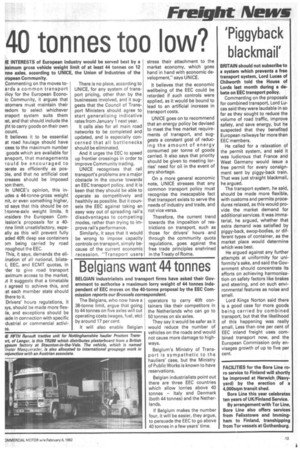40 tonnes too low?
Page 7

If you've noticed an error in this article please click here to report it so we can fix it.
E INTERESTS of European industry would be served best by a ximum gross vehicle weight limit of at least 44 tonnes on 12 ne axles, according to UNICE, the Union of Industries of the iropean Community.
Commenting on the moves toards a common transport )licy for the European Econoic Community, it argues that istomers must maintain their 3edom to select whichever )nsport system suits them fst, and that should include the )ht to carry goods on their own :count.
It believes it to be essential at road haulage should have :cess to the maximum number goods which are available for ansport, that managements iould be encouraged to oerate as efficiently as posble, and that no artificial cost creases should be imposed oon them.
In UNICE's opinion, this inudes a 44-tonne-gross weight nit, or even something higher, Id says that this should be on -tonne-axle weight limits. It )nsiders the European Comission's proposals for a 40fine limit unsatisfactory, espeally as this will prevent fully aded 40ft deep sea containers om being carried by road roughout the EEC
This, it says, demands the eliiination of all national, bilateEEC, and ECMT quotas, in 'der to give road transport iaximum access to the market, it it suggests that a timetable a agreed to achieve this, and 'at each member state should Thereto it.
Drivers' hours regulations, it lys, should be made more flexile, and exceptions should be lade in connection with specific idustrial or commercial activi
BS.
There is no place, according to UNICE, for any system of transport pricing, other than by the businesses involved, and it suggests that the Council of Transport Ministers should agree to start generalising indicative rates from January 1 next year.
It calls also for all main road networks to be completed and updated, and is especially concerned that all bottlenecks should be eliminated.
And it urges the EEC to speed up frontier crossings in order to improve Community trading.
UNICE recognises that rail transport's problems are a major obstacle in the course towards an EEC transport policy, and it is keen that they should be able to operate as competitively and healthily as possible. But it counsels the EEC against taking an easy way out of spreading rail's disadvantages to competing modes, rather than trying to improve rail's performance.
Similarly, it says that it would be wrong to impose capacity controls on transport, simply because of the current economic recession. "Transport users stress their attachment to the market economy, which goes hand in hand with economic development," says UNICE.
ft believes that the economic wellbeing of the EEC could be retarded if such controls were applied, as it would be bound to lead to an artificial increase in transport costs.
UNICE goes on to recommend that an energy policy be devised to meet the free market requirements of transport, and suggests a constant goal of reducing the amount of energy consumed per tonne of goods carried. It also says that priority should be given to meeting lorries' need for oil in the event of any shortage.
On a more general economic note, UNICE stresses that any common transport policy must recognise the inescapable fact that transport exists to serve the needs of industry and trade, and not vice versa.
Therefore, the current trend towards the imposition of restrictions on transport, such as those for drivers' hours and through the community quota regulations, goes against the free trade principles enshrined in the Treaty of Rome.


































































